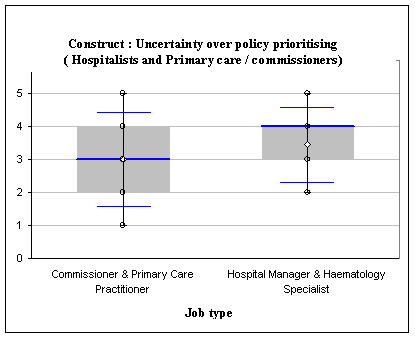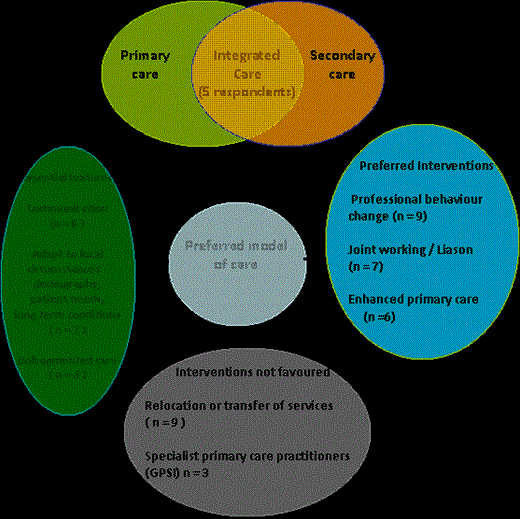Clinical Haematology is a specialised service largely delivered in District General & Tertiary Hospitals. Most haematological malignancies are chronic disorders often in the elderly with a simple clinical management plan, requiring periodic clinical monitoring. Many cases are non progressive. In English NHS, provision of specialised care in community is proposed as a cost efficiency measure & also sits well with ‘Localism where possible, centralisation where necessary' principle. There is little published evidence in context of clinical haematology services in the community.
This research is confined to clinical haematology services in West Kent, England evaluating attitudes and behaviours of health professionals, analysing desirable features in a community model of care and finally comparing costs in hospital and community settings.
This is a descriptive non experimental cross sectional qualitative comparative group study with a two stage strategy. In the first stage, an anonymised web based survey consisting of open and closed items was conducted in a convenience sample of key stakeholders. To secure completeness and gain broader and holistic understanding of the rationale behind the survey findings, individual face to face semi structured interviews were conducted.
Pilot survey (7 respondents) ; Main survey : convenience sample of 228 stakeholders; 49 responded (21.5%) with 35 complete datasets and 14 datasets missing some information. Respondent characteristics (n=49): age (< 39 years, n = 5), (40 – 54, 19), (> 55, 11) ; males 20 ; females 15; job type: Commissioners n = 3, Hospital managers 7 , Haematologists 7 & Primary care practitioners 19.
There is an increasing demand for clinical haematology services with a rising elderly population. At least 25 percent clinical haematology outpatient and day case services may be safely shifted to a community setting. There were wide variations in views with regards to policy priorities. There are professional divisions with hospitals less likely to drive the change. Respondents identified the following barriers in providing community care: technological; regulatory and governance; skill set (lack of specialist skills); patient safety (resuscitation facilities; specialist supervision) & uncertainty of cost effectiveness.
Qualitative analyses of interviews suggest professional barriers are probably surmountable by the positive contribution of system leadership, collaborative working, introduction of appropriate technological tools and robust communication.
Clinical commissioners will have to provide systemic leadership. There is a desire to ‘integrate' services though there was lack of clarity about what ‘integration' meant.
Haematologists appeared to be more sceptical of policies. Hospital managers, haematologists and those above 40 years were more supportive of hospital based outpatient clinics. Those above 55 years and hospital managers were less likely to support ‘localism' while it resonated strongly with commissioners. There were wide variations in views with regards to policy priorities and ‘statistically significant' differences (p value .003 at 95 percent CI) between those in favour of hospital care (haematologists & hospital managers) and primary care (primary care practitioners & commissioners) (Figure 1).
Box- and- whisker plot
Specialist haemato-oncology services are clearly necessary and this research project does not seek to challenge that. In face of the policy of ‘centralising' specialist services, these findings suggest an ‘anomaly' that barriers can be overcome and specialist services to some extent can be provided in the community (Figure 2). Innovative ways of delivering specialised care is fundamental to meet this challenge.
Concept map ‘service perception’
An inductive – deductive cycle of discovery will further improve our understanding of why ‘closer to home' services may or may not work for some specialities such as clinical haematology and define the ‘boundary' conditions better.
The project will aid commissioners & decision makers involved in reconfiguration of clinical haematology services in English NHS.
No relevant conflicts of interest to declare.
Author notes
Asterisk with author names denotes non-ASH members.



